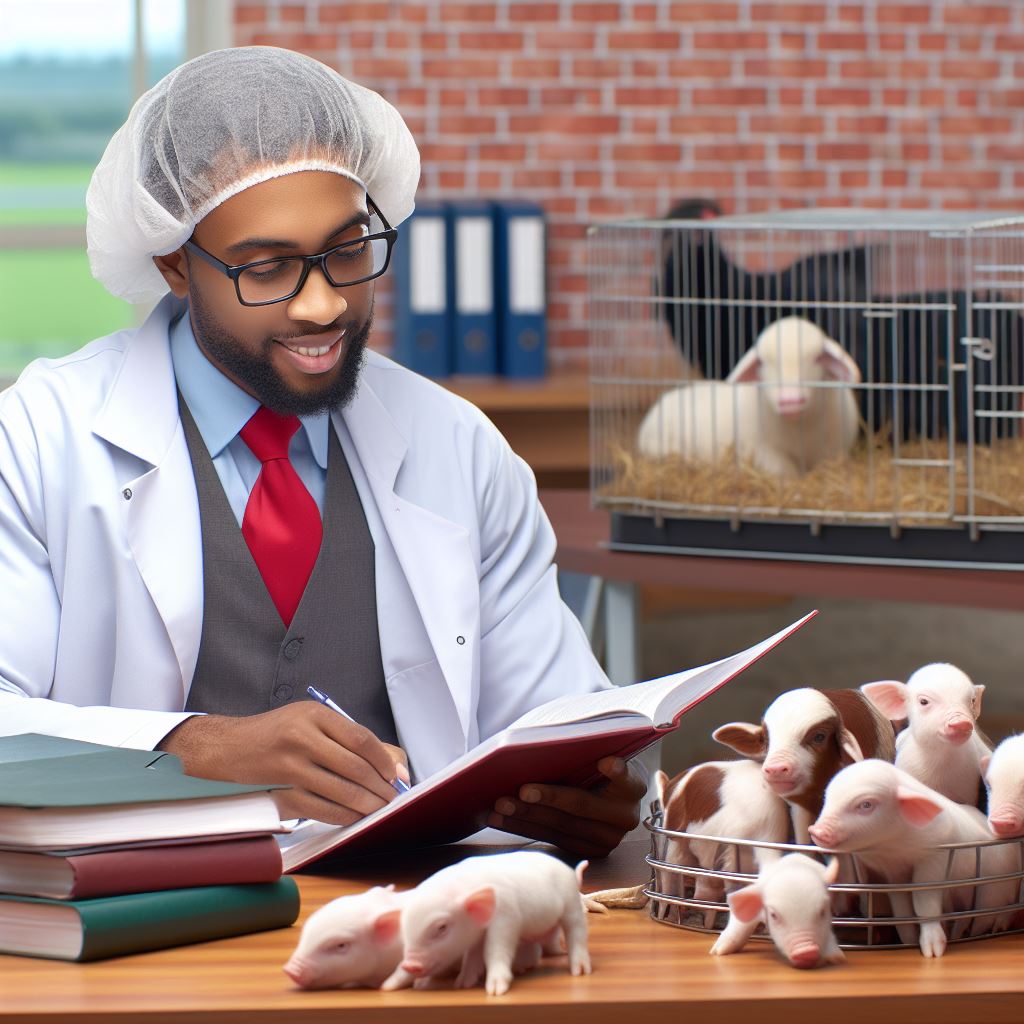Introduction
Animal production is a significant aspect of Nigeria’s agricultural sector.
It involves the rearing of livestock such as cattle, poultry, and fish, as well as the production of animal products like meat, milk, eggs, and leather.
This industry contributes to food security, job creation, and economic growth in the country.
Practical training in animal production is essential for students in Nigerian universities.
It allows them to gain practical experience and develop skills necessary for successful careers in the field.
Through hands-on activities, students can learn about animal health and nutrition, breeding, disease management, and farm management practices.
The purpose of this blog post is to highlight the importance of practical training in universities for animal production.
By engaging in practical exercises, students can apply theoretical knowledge to real-life scenarios.
They can learn how to handle and care for animals, diagnose and treat diseases, plan and manage efficient animal production systems, and implement best practices to maximize productivity.
Furthermore, practical training provides students with the opportunity to work closely with industry professionals and gain exposure to various animal production practices and technologies.
This exposure enhances their understanding of the industry and prepares them for the challenges they may face in their careers.
In essence, practical training in Nigerian universities for animal production is crucial for students to acquire the necessary skills and knowledge for successful careers in the field.
This blog post will delve into the importance and purpose of such training, emphasizing its role in equipping students to contribute effectively to the animal production sector.
Challenges of Practical Training in Nigerian Universities for Animal Production
Limited resources and infrastructure
Nigerian universities face dire challenges in animal production practical training.
Resources, a foundational pillar, remain distressingly scarce. Insufficient funds constrain the development of essential infrastructure.
These challenges, intertwined and pervasive, jeopardize the quality of animal production education in Nigerian universities.
Limited resources and infrastructure, marked by inadequate funding and support, impede progress.
Lack of adequate facilities for hands-on learning
Crucially, the absence of requisite facilities hampers hands-on learning opportunities. Laboratories, farms, and equipment, imperative for practical exposure, fall short in provision.
Furthermore, the deficiency in facilities obstructs the transformation of theoretical knowledge into practical prowess.
The absence of well-equipped laboratories, farms, and tools hinders the experiential learning crucial in animal production education.
Insufficient practical exposure for students
Students endure a dearth of practical engagement, impeding their skill acquisition.
Theoretical prowess lacks translation into applied expertise. Practical encounters, crucial for holistic learning, remain scanty.
Moreover, the glaring insufficiency in practical exposure deprives students of hands-on encounters.
The gap between classroom teachings and real-world application widens, thwarting students’ comprehensive understanding and skill development.
Addressing these challenges
Addressing these challenges mandates multifaceted approaches.
Government support, increased funding, and strategic partnerships can alleviate resource constraints.
Collaborations with industries enable access to modern facilities and equipment, bridging the gap between theory and practice.
Implementing a curriculum restructuring emphasizing practical training can also bolster students’ hands-on experiences.
Encouraging internships, workshops, and field trips enriches their exposure, fostering a more comprehensive education.
In fact, rectifying these challenges demands a concerted effort from various stakeholders.
Prioritizing resource allocation, enhancing facilities, and augmenting practical exposure can overhaul animal production education in Nigerian universities.
Only then can students receive a well-rounded education and emerge as adept professionals in the field of animal production.
Read: Innovative Farming Practices: A Look into Nigerian Farms
Importance of Practical Training in Animal Production
Enhances practical skills development
- Practical training in animal production allows students to gain hands-on experience in real-life scenarios.
- Students learn essential skills such as animal handling, breeding techniques, and health management.
- Through practical training, students can develop proficiency in various aspects of animal production.
- Hands-on experience fosters confidence and competence in carrying out animal production activities.
- Practical training provides an opportunity for students to apply theoretical knowledge acquired in classrooms.
Bridges the gap between theory and practice
- Often, theoretical knowledge alone is not sufficient to excel in the field of animal production.
- Practical training helps students understand how theoretical concepts are implemented in real-world scenarios.
- Students can observe and participate in practical activities to gain a deeper understanding of animal production.
- Practical training enables students to grasp the practical implications of theoretical principles.
- By bridging the gap between theory and practice, practical training enhances students’ overall learning experience.
Prepares students for real-life situations in the field
- Animal production involves numerous challenges and complex situations that cannot be fully understood through theory alone.
- Practical training exposes students to real-life scenarios they are likely to encounter in their future careers.
- Students learn to handle unexpected situations, make quick decisions, and adapt to changing circumstances.
- Practical training equips students with problem-solving skills needed to navigate the complexities of animal production.
- By preparing students for real-life situations, practical training enhances their employability and career prospects.
In short, practical training plays a vital role in the development of animal production students.
It enhances their practical skills, bridges the gap between theory and practice, and prepares them for real-life situations in the field.
Through hands-on experience, students gain proficiency, confidence, and a deeper understanding of animal production principles.
Practical training is essential in ensuring that students are well-prepared and equipped to excel in their future careers in animal production.
Read: Graduate Stories: Successes in Animal Genetics from Nigerian Alumni
Initiatives to Improve Practical Training in Nigerian Universities
Government interventions and policies
- The government should allocate more funds towards improving practical training facilities in universities.
- Introduce policies that encourage collaboration between universities and industries for practical training.
- Create training programs that equip students with practical skills required for the animal production industry.
- Establish regulatory bodies to ensure the quality and relevance of practical training in universities.
- Provide scholarships and grants for students pursuing animal production courses to enhance practical training opportunities.
Collaboration with industry professionals and stakeholders
- Invite professionals from the animal production industry to serve as guest lecturers in universities.
- Organize internships or apprenticeship programs with industry partners to provide practical hands-on experience.
- Establish partnerships between universities and relevant professional associations for knowledge sharing and practical training.
- Encourage industry professionals to provide mentorship programs for students to bridge the gap between theoretical knowledge and practical skills.
- Conduct regular industry visits for students to observe and participate in real-life animal production activities.
Providing better resources and infrastructure for practical training
- Invest in modern and well-equipped laboratories for students to conduct practical experiments and research.
- Upgrade livestock farms within universities to ensure students have access to a wide range of animals for practical training.
- Provide necessary tools, equipment, and technology for students to practice various aspects of animal production.
- Offer specialized workshops and training programs for university staff to enhance their knowledge and teaching methodologies.
- Create partnerships with agricultural research centers and institutes to access their resources for practical training purposes.
In general, improving practical training in Nigerian universities for animal production requires a multi-dimensional approach.
The government should prioritize investments and policies that enhance practical training facilities, while fostering collaboration between universities and industry professionals.
Transform Your Career with Expert Guidance
Get personalized mentorship consulting that’s tailored to your unique path. Our expert advice is actionable and exclusive.
Get StartedAdditionally, providing better resources and infrastructure will further enhance students’ practical skills and knowledge.
By implementing these initiatives, Nigerian universities can produce graduates who are well-prepared for the challenges and demands of the animal production industry.
Read: Forestry Graduate Experiences: Stories from Nigerian Alumni

Successful Case Studies of Practical Training in Nigerian Universities
Practical training plays a crucial role in the education of animal production students in Nigerian universities.
Through hands-on experience, students develop practical skills and gain a deeper understanding of the field.
The University of Ibadan and the University of Lagos are two institutions that have successfully implemented practical training programs in animal production, resulting in positive outcomes for students.
University of Ibadan’s Approach to Practical Training in Animal Production
The University of Ibadan offers a comprehensive practical training program in animal production.
This program includes various activities such as farm visits, laboratory experiments, and fieldwork.
Students are actively involved in all stages of animal production, from animal handling to breeding and management.
Students who have participated in the practical training program at the University of Ibadan have expressed their satisfaction with the hands-on experience gained.
They appreciate the opportunity to apply theoretical knowledge in real-life situations.
This practical training has equipped them with practical skills and has deepened their understanding of animal production.
University of Lagos’ Initiatives for Hands-On Learning
The University of Lagos has also taken initiatives to enhance hands-on learning for animal production students.
They have implemented a well-structured practical training curriculum.
The curriculum is designed to provide students with a comprehensive understanding of animal production techniques and practices.
Through these initiatives, students at the University of Lagos have demonstrated improved practical skills and a deeper understanding of animal production.
They are more confident in handling animals and have a better grasp of the challenges faced in the field.
This hands-on learning approach has effectively bridged the gap between theoretical knowledge and practical application.
In review, practical training programs in Nigerian universities, such as those at the University of Ibadan and the University of Lagos, have been successful in equipping animal production students with practical skills and a deeper understanding of the field.
These case studies serve as examples of how effective hands-on learning can positively impact students’ skill development and prepare them for successful careers in animal production.
Read: The Role of Forestry in Nigeria’s Sustainable Development Goals
Recommendations to Enhance Practical Training in Nigerian Universities
Implementing student-centered teaching methodologies
These recommendations are crucial in improving practical training in Nigerian universities for animal production.
By implementing student-centered teaching methodologies, students will be more actively involved in their learning process, leading to a better understanding of theoretical concepts and their practical applications.
Group discussions, problem-solving activities, and hands-on experiments will stimulate critical thinking and enhance practical skills.
Ensuring regular industrial visits and internships
Furthermore, organizing regular industrial visits and internships will expose students to real-life scenarios in animal production.
Visiting companies and farms will provide opportunities for students to observe and learn from industry professionals.
Participating in internships will allow students to apply their theoretical knowledge in practical settings, fostering a deeper understanding of the subject matter.
Creating partnerships with industry experts for mentorship programs
Creating partnerships with industry experts will provide students with valuable mentorship opportunities.
By assigning individual mentors and organizing workshops and seminars, students can learn from professionals who have extensive experience in the field.
Networking with industry experts will enable students to gain insights and guidance, paving the way for successful careers in animal production.
In a nutshell, enhancing practical training in Nigerian universities for animal production requires the implementation of student-centered teaching methodologies, regular industrial visits and internships, and partnerships with industry experts for mentorship programs.
By adopting these recommendations, universities can provide students with a well-rounded education that prepares them for the challenges of the industry and empowers them to contribute effectively to the field of animal production.
Conclusion
Practical training plays a crucial role in animal production education in Nigerian universities.
It enhances students’ knowledge and skills, allowing them to apply theoretical concepts learned in the classroom to real-life situations.
The urgency to improve practical training cannot be overstated.
With rapid advancements in the animal production industry, students need adequate exposure to modern techniques and technologies.
The current curriculum often lags behind, failing to provide students with the necessary practical experience.
This gap needs to be addressed promptly to produce competent graduates who can meet the industry’s demands.
Stakeholders and policymakers must prioritize practical training in Nigerian universities.
They should allocate sufficient resources to improve practical facilities, including well-equipped laboratories and farms.
Collaboration with industry professionals and organizations can also enhance practical training opportunities.
Furthermore, curriculum review should be undertaken to ensure it aligns with industry trends and demands.
By integrating practical training into diverse courses, universities can produce graduates who are well-prepared for the workforce.
The commitment of stakeholders and policymakers is vital in prioritizing practical training.
By providing students with valuable practical experience, Nigerian universities can bridge the gap between academic knowledge and industry requirements, ultimately benefiting both students and the animal production sector as a whole.




